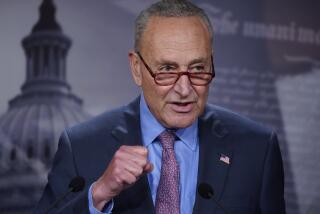Universal Coverage Goal Survives the Cuts : Congress: The various committees that will eventually issue their own versions of a health reform bill have not abandoned Clinton’s core objective.
- Share via
WASHINGTON — A House Education and Labor subcommittee on Thursday became the second congressional panel to begin work on health care reform, but most of the real legislative action was taking place elsewhere behind the scenes.
It is difficult to gauge how that effort is faring, because no fewer than five congressional committees will eventually produce their own versions of the bill. The House and Senate leadership will then try to meld the bills into something both chambers can accept.
For all the uncertainty, the White House has taken heart that the committees are hewing to President Clinton’s goal of health coverage for every American--despite polls showing that public enthusiasm for overhauling the health care system is waning.
But most, if not all, of the committees are likely to abandon the bureaucratic structure of the Clinton plan, which would require most Americans to join government-organized purchasing cooperatives.
The biggest battles are being fought over three key issues--whether to require employers to buy health coverage for their workers, whether to impose government controls on health care costs and what kinds of benefits to guarantee every American.
Only one panel--the House Ways and Means health subcommittee--has acted so far. It has endorsed a requirement that companies help pay for their workers’ health coverage, and it would expand the Medicare program to cover the remaining uninsured.
However, subcommittee Chairman Pete Stark (D-Hayward) said Thursday that it is far from certain whether the full committee will follow the outlines of the subcommittee bill.
For some committees, such as the generally liberal House Education and Labor Committee that began the official work on its draft Thursday, the outcome seems preordained. That panel is expected to approve a bill similar to Clinton’s proposal and another bill that endorses a government-financed health care system--known as “single payer”--that is modeled after Canada’s national health system.
But for other committee chairmen, trying to fashion an agreement among members who are splintered according to their philosophical leanings and their regional interests, the results are open to question.
Nowhere are negotiations more delicate than among the largely moderate and conservative Democrats of the House Energy and Commerce Committee. Chairman John D. Dingell (D-Mich.) said Thursday that he was “very close” to the 23 votes he needs.
Under Dingell’s proposal, employers of fewer than 10 workers--almost 80% of all businesses--would not have to pay anything for employee health coverage. Businesses of between 10 and 20 workers also could choose not to pay their employees’ health insurance costs directly, but would be subject to a tax of 1% to 2% if they did not.
The provision marks a significant shift from Clinton’s original plan, which would require all employers to pay up to 80% of their workers’ health costs. Government subsidies would ease the burden of small firms that have low-paid workers.
Rep. Jim Slattery (D-Kan.), a crucial uncommitted committee member, said he is exploring a dramatically different option, “building on” the latest proposal from a group of health experts and business leaders who call themselves the Jackson Hole group. That plan would have no employer mandate and does not guarantee universal coverage.
Also on Thursday, the subcommittee on labor-management relations of the House Education and Labor Committee began considering a bill drafted by chairman Pat Williams (D-Mont.). It resembles Clinton’s, but offers even more generous benefits and reduces the burden on small businesses.
Williams’ bill retains the employer mandate, but it would cap the required premium contributions by the smallest employers at 2% of payroll instead of 3.5%, as proposed by Clinton.
More to Read
Get the L.A. Times Politics newsletter
Deeply reported insights into legislation, politics and policy from Sacramento, Washington and beyond. In your inbox twice per week.
You may occasionally receive promotional content from the Los Angeles Times.










